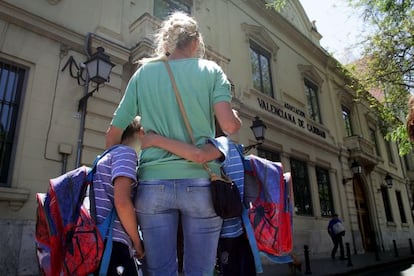Charity begins in school as soup kitchens register rise in numbers
NGO reports 64-percent increase in entire families seeking food aid

Petra, a 37-year-old married woman, picks up her seven- and nine-year-old kids from school at lunchtime. Ever since their school cafeteria grant ran out, they eat elsewhere - but not at home. Around 2pm, they walk into Casa Caridad, a charity organization in Valencia, on Paseo de la Pechina. It is three kilometers away from their school in Orriols. That means they cover six kilometers every day. On this particular occasion, they have to hurry to get back in time for afternoon classes. "The bus costs money, we have legs," says Petra.
Two-and-a-half years ago, Petra and her husband moved to Spain from the Czech Republic, where the crisis had sunk their small textile business. At first things went well, and Petra got a raise at the vegetable warehouse where she worked in Meliana (Valencia). But the company shut down a year ago and she was out of a job. Her husband has had surgery on his spine and cannot work. The school cafeteria grant only covered 70 percent of the school year, so for the last two months Petra has had to find another solution. "I don't want to say that I'm ashamed, but I am a little," she says, averting her blue eyes.
In 2012, Casa Caridad fed twice as many children as the year before - 11,600 of them, mostly between four and 11 years of age. Of these, 8.4 percent come every day, according to the latest Valencia Poverty Report.
The average charity seeker has changed in recent years, the organization says. It used to be homeless individuals, but now entire families who had never been on welfare before are showing up. This year, the presence of entire families has risen 64 percent at Casa Caridad's soup kitchens. In fact, the charity has had to open a new center in Valencia to meet demand.
Increasingly, more children are getting their main meal at school"
There is no official data on how many children have their main meal at school. Neither the regional education department, nor the welfare services, nor the Federation of Parents Associations report any specific complaints, but outside the school gates, it's a different story entirely.
"Increasingly, more children are getting their main meal at school. This is a reality we have confirmed, and this year it has been noticeable," says Vicent Ripoll, president of the Association of Preschool and Primary School Principals.
"I don't know how people survive, but they do," says Manuel Bermejo, principal of the Miguel Hernández public school in Orriols, one of the Valencia neighborhoods with the highest number of immigrant residents.
At most Spanish schools, kids either go home during the lunch break or eat cafeteria food - they are not allowed to bring their lunch from home. The school grants range from 70 to 100 percent of the cost of cafeteria lunches.
Now, school directors have to deal with the families who fail to pay the lunch fees, and with the regional government's late payments - the Valencia Generalitat has not paid seven out of the eight months of grant money. "We are at the end of the year, and we are 2,370 euros in debt," says Manuel Bermejo.
Given the situation, some public schools are accepting help from private companies to launch food programs or cover debt. Hasbro, the toy multinational, has started a partnership with special education centers, paying for breakfast and lunch for at-risk students.
A principal from a school in Benimàmet says that food at public schools should be fully subsidized. "Without food you cannot study and you cannot learn."
Tu suscripción se está usando en otro dispositivo
¿Quieres añadir otro usuario a tu suscripción?
Si continúas leyendo en este dispositivo, no se podrá leer en el otro.
FlechaTu suscripción se está usando en otro dispositivo y solo puedes acceder a EL PAÍS desde un dispositivo a la vez.
Si quieres compartir tu cuenta, cambia tu suscripción a la modalidad Premium, así podrás añadir otro usuario. Cada uno accederá con su propia cuenta de email, lo que os permitirá personalizar vuestra experiencia en EL PAÍS.
¿Tienes una suscripción de empresa? Accede aquí para contratar más cuentas.
En el caso de no saber quién está usando tu cuenta, te recomendamos cambiar tu contraseña aquí.
Si decides continuar compartiendo tu cuenta, este mensaje se mostrará en tu dispositivo y en el de la otra persona que está usando tu cuenta de forma indefinida, afectando a tu experiencia de lectura. Puedes consultar aquí los términos y condiciones de la suscripción digital.








































